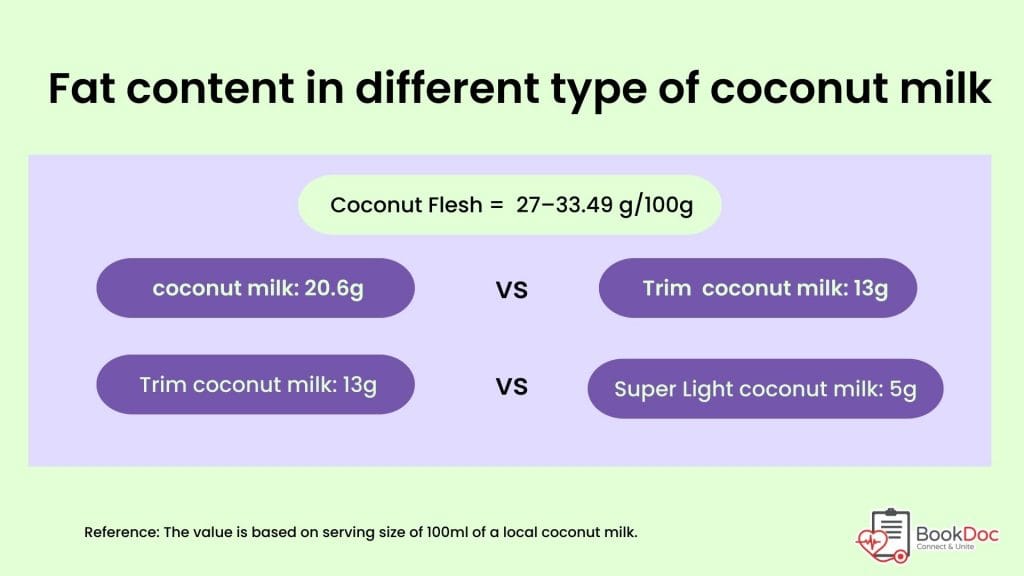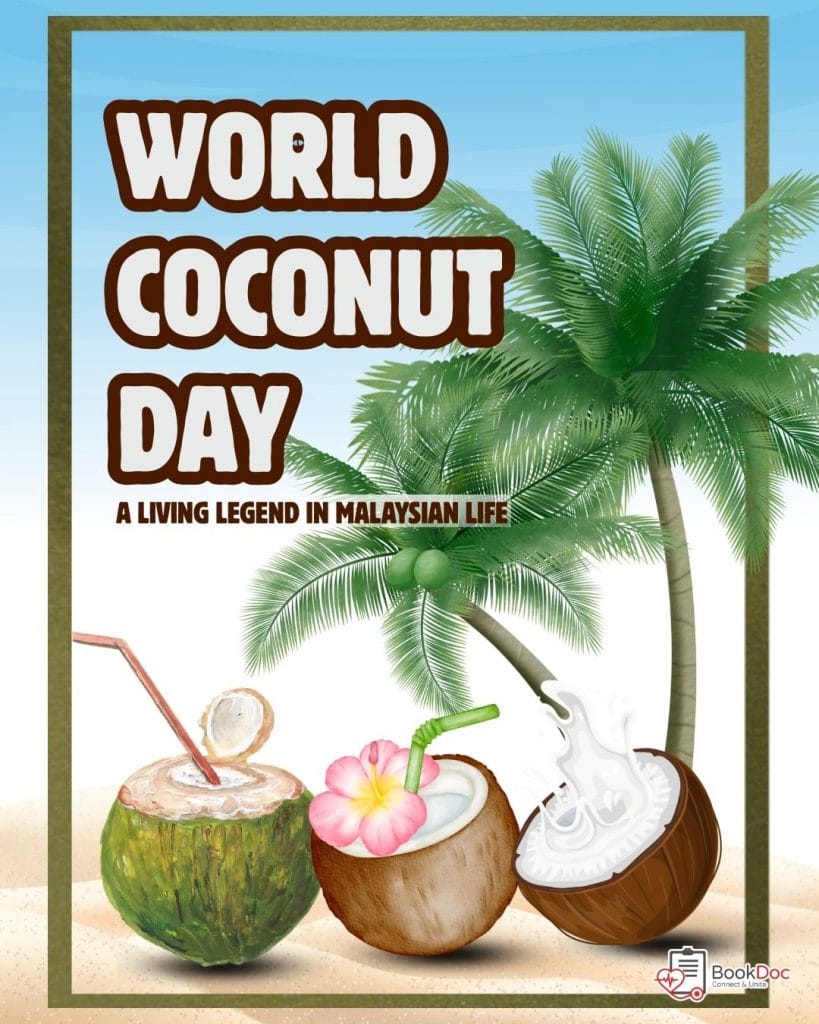
Every year on World Coconut Day, we are reminded of how this humble tree has shaped lives across the tropics—providing food, inspiring traditional games, and sustaining livelihoods. In Malaysia, the coconut tree is more than just a plant; it is a living legend deeply rooted in our daily life, from the kitchen to cultural traditions.
In this article, we will explore the coconut tree’s practical uses in Malaysian life, highlight its nutritional and health benefits, and share tips on enjoying coconut-rich dishes in moderation—celebrating the coconut tree as a timeless gift to our culture.
Nothing Goes to Waste: Coconut’s Daily Benefits from Husk to Leaf
This living legend has nourished us, sheltered us, and even entertained us across generations. The many uses of the coconut tree, showing how every part can be turned into food, drink, household items, or building materials. Let’s have a look.
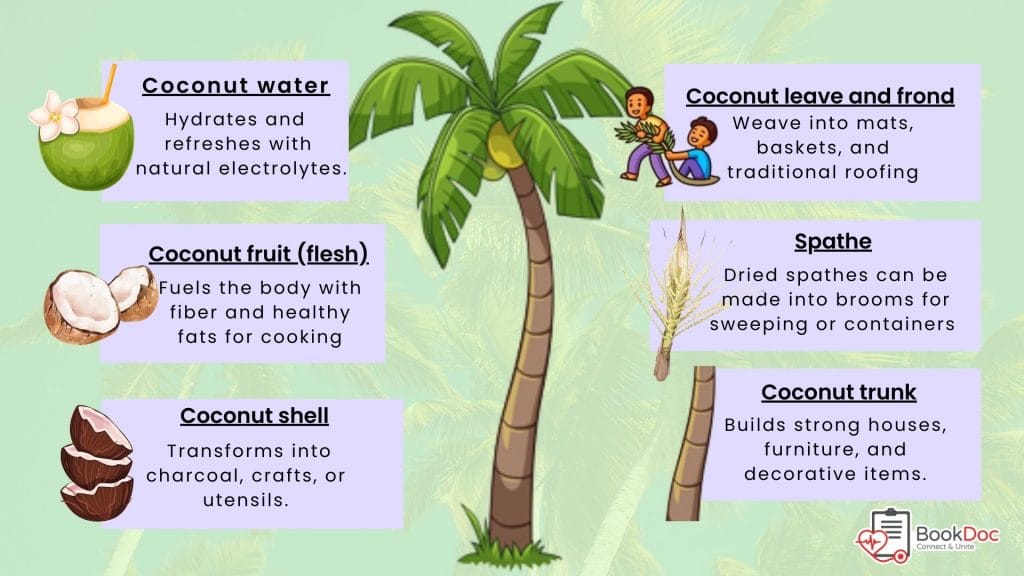
Not just that…Beyond food and daily use, the coconut tree has even made its way into our games and pop culture…
Have you ever noticed in the cartoon Upin & Ipin that the characters play a game called tarik upih? The “upih” is the dried coconut frond. In the past, this was a popular village game where one child would sit on the frond while another pulled it as fast as they could — a simple yet exciting way kids used to have fun.

But as Nourishment, Is It Really Good For Us? Here’s What to Know
We’ve seen how every part of the coconut tree plays a role in daily life — from the leaves to the roots. But here’s the real question: what happens when the coconut itself becomes part of our diet? Its nutritional value doesn’t just feed us; it can actually impact our health.
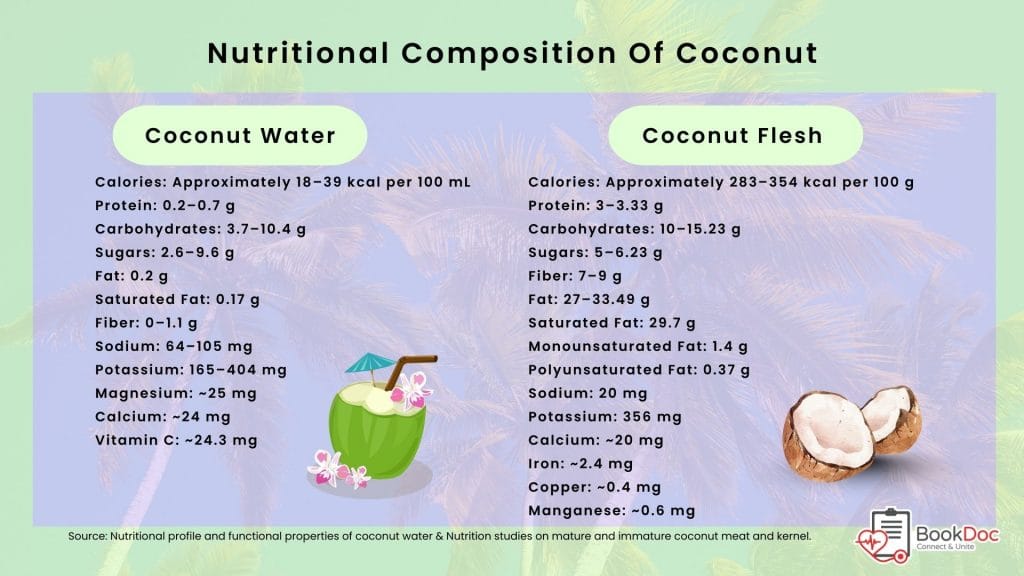
So, what do these numbers actually mean for our health?
Now that we’ve broken down the nutritional makeup of coconut water and flesh, let’s explore how these nutrients benefit the body. Here’s how including coconut in your diet can support your overall well-being:
Essential Minerals That Support Hydration
Coconut water naturally contains key minerals such as potassium, magnesium, calcium, and sodium, which help keep the body hydrated. In fact, studies show it works just as well as sports drinks in replacing fluids after sweating (1)(2).
Anti-Ageing Effects and Cell Protection
Coconut water also comes with unique plant compounds called cytokinins, such as kinetin and zeatin (3). Early research found that these natural compounds may be linked to slowing down cell ageing, supporting cell repair, and protecting against damage caused by stress and free radicals.
Protect Kidney Health
Coconut water may help lower the risk of kidney stones. It helps dilute your urine, reduces crystal formation, and increases helpful substances in your urine, like citrate and potassium, which support kidney health (4).
Fibre and Potassium: Natural Support for Heart Health
Research shows that coconut fibre can help lower cholesterol. In a randomised crossover trial, participants with moderately high cholesterol who ate coconut flakes (made from coconut flour) experienced significant drops in total cholesterol, LDL (‘bad’) cholesterol, and triglycerides—especially when the flakes contained 15–25% fibre (5). These results highlight the potential benefits of coconut by-products that are high in fibre, which may not be the same as eating fresh coconut flesh. Meanwhile, potassium in coconut water helps balance sodium, supporting healthy blood pressure (6). When blood pressure is controlled, it reduces strain on the arteries and the heart—keeping the heart healthier in the long run.
Medium-Chain Triglycerides (MCTs) as Quick Energy Boost.
Coconut flesh contains medium-chain triglycerides (MCTs)—fats that the body can quickly convert into energy rather than storing as long-term fat. This makes coconut milk a convenient source of quick energy for the body (7).
Delicious but Dense: Why Coconut Flesh Should Be Enjoyed in Moderation
While coconut flesh offers healthy fats and fiber that support satiety and energy, it’s also calorie-dense. Enjoying it as part of a balanced diet is important to avoid overconsumption because of their fat content.
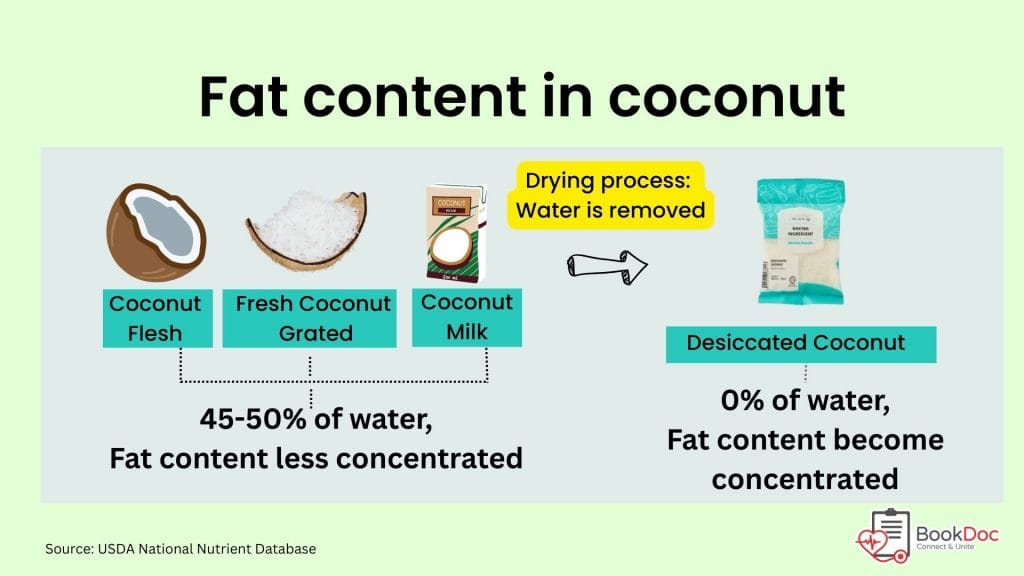
Fresh grated coconut flesh and coconut milk still holds water, so its fat is less concentrated — but once dried into desiccated coconut, the fat becomes much more concentrated. On the other hand, coconut milk has less fat compared to desiccated coconut yet in cooking we usually use much larger amounts of coconut milk, so it ends up contributing more fat per meal. Overall, coconut in any form should be eaten in moderation due to its high saturated fat content.
But like all good things, balance is key. So, how much is considered enough? Let’s look at what the guidelines recommend:
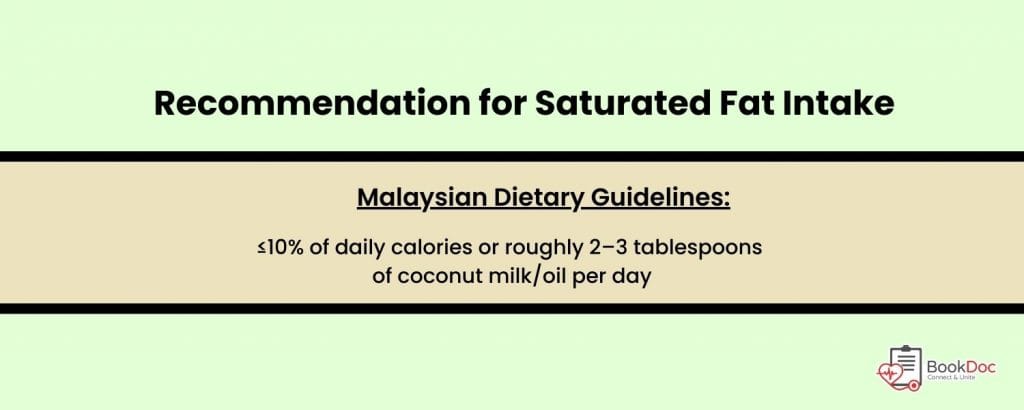
The Malaysian Dietary Guidelines recommend keeping saturated fat to ≤10% of daily calories, which is about 2–3 tablespoons of coconut milk or oil per day. But keep in mind, if you already take 2–3 tablespoons of coconut oil, you’ll need to reduce other sources of cooking oil or fats in your main meals for that day. This way, your total fat intake stays within a healthy range. For coconut water, enjoy up to one small glass (~200–250 ml) daily, or ~300–400 ml after moderate activity.
How to Enjoy a Coconut-Rich Dish Without Overdoing It
As Malaysians, it’s hard to avoid coconut-rich dishes. The good news? You can still enjoy your favourites — here’s how to do it wisely:
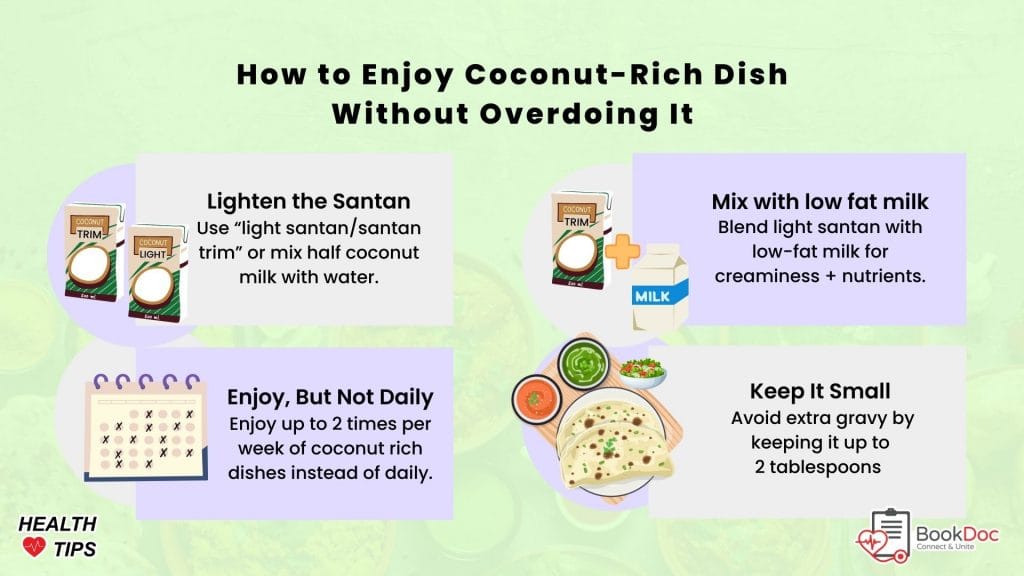
The Takeaway
The coconut tree is more than a source of nourishment—it is a symbol of resilience, culture, and everyday utility for Malaysians. From enriching our cuisine to supporting daily life and traditions, it continues to stand as the ‘tree of life’ for our communities.
As we celebrate World Coconut Day, let us appreciate its many gifts while enjoying coconut-rich dishes in moderation, balancing tradition with health. In doing so, we honour the coconut tree as a timeless gift woven into Malaysian culture, carrying its legacy forward for generations to come.
References
Reference:
- Ismail, M., Laitano, O., & Aragon-Vargas, L. F. (2007). Comparison of coconut water and a carbohydrate-electrolyte sport drink on measures of hydration and physical performance in exercise-trained men. Journal of the International Society of Sports Nutrition, 4(1), 1. https://doi.org/10.1186/1550-2783-4-1
- Saat, M. A., Ismail, M., & Aragon-Vargas, L. F. (2002). Comparison of coconut water and a carbohydrate-electrolyte sport drink on measures of hydration and physical performance in exercise-trained men. Journal of the International Society of Sports Nutrition, 4(1), 1. https://doi.org/10.1186/1550-2783-4-1
- Yong, J. W., Ge, L., Ng, Y. F., & Tan, S. N. (2009). The chemical composition and biological properties of coconut (Cocos nucifera L.) water. Molecules (Basel, Switzerland), 14(12), 5144–5164. https://doi.org/10.3390/molecules14125144
- Laitano, O., Perez-Idarraga, A., & Aragon-Vargas, L. F. (2014). Comparison of coconut water and a carbohydrate-electrolyte sport drink on measures of hydration and physical performance in exercise-trained men. Journal of the International Society of Sports Nutrition, 11(1), 1. https://doi.org/10.1186/s12970-014-0031-5
- Trinidad, T. P., Loyola, A. S., Mallillin, A. C., Valdez, D. H., Askali, F. C., Castillo, J. C., Resaba, R. L., & Masa, D. B. (2004). The cholesterol-lowering effect of coconut flakes in humans with moderately raised serum cholesterol. Journal of medicinal food, 7(2), 136–140. https://doi.org/10.1089/1096620041224148
- Awaluddin, & Pristika, A. (2024). The Effect of Young Coconut Water on Blood Pressure in Hypertensive Patients. JPMA. The Journal of the Pakistan Medical Association, 74(5 (Supple-5)), S51–S54. https://doi.org/10.47391/JPMA.Ind-RInC-14
- St-Onge, M. P., Bosarge, A., & Goree, L. L. (2003). Medium-chain triglycerides increase energy expenditure and decrease adiposity in overweight men. Obesity Research, 11(3), 395-402. https://doi.org/10.1038/oby.2003.53








